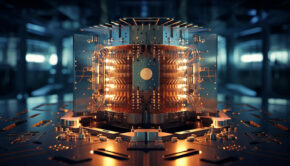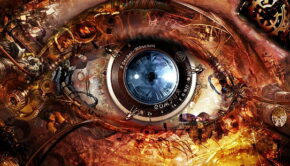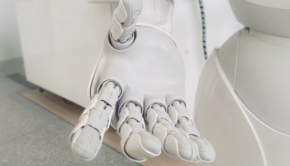The Next Rising Star of Future: Quantum Computing
Years ago, smartphones were considered as the ultimate computing wizardry. Alike the classical computers were unimaginable to the previous generations and we are facing the birth of an entirely new type of computation something so mesmerizing such as quantum computing. We need to scan back through our yellow copies of computer magazine to figure out few repeated reference to quantum computers that claim to be the next big thing for the future. Quantum computing seems too far out there for some developers. Some people even spin their head on hearing the word quantum. But there is nothing so anxious about the concept.
A question might arise why there are no quantum computers on the desk at our PC world yet? The answer is Quantum computers do exist but not on the local high street, as you have to specifically visit the laboratories of huge brands like Google and IBM.

Image courtesy: Freepik
What is Quantum Computing?
The concept contains the properties of quantum physics which can be applied to process the information. It operates the data with nanoscale components at temperatures colder than an intergalactic scope and can claim to solve the world’s toughest problem in hours or days which might take years long on our regular PCs. Quantum computers are defined as an entirely new technology which can help mankind to solve the challenges that cannot be solved in any other way.
But, How do they Work?
The quantum computers consist of qubits which are a small quantum bit or a quantum unit to process your data. In the beginning, the computers manipulate qubits by processing everything be it text, images, videos and so on- relying on large strings of 1s and 0s or either bit. A qubit is supposed to hold both the values at the same time which is known as superposition state. But, when multiple qubits are acting coherently, they can process multiple options simultaneously which allows them to process data in a fraction of the seconds for that it would take even the fastest nonquantum systems.
Hence, qubits can be defined as the superconducting electron or some type of subatomic particles on which the quantum computing replies. Managing the qubits is a huge scientific and engineering challenge without any doubt. For instance, IBM relies on multiple layers of superconducting circuits that are sequestered in a controlled environment and cooled up step-wise to colder temperatures than a deep space nearly to absolute zero. The qubits living in quantum have some crazy properties. If a coin is taken into a bit as heads (0) or tails (1), then qubits are a spinning coin as they simultaneously head or tails with each state having a different probability. The calibrated microwave pulses put these qubits into superposition, with same frequencies and durations to flip the qubit in a slightly different state.
Another state it possesses is the entanglement which applies microwave pulses between a pair of qubits to entangle them for existing in the same quantum state. The last one is interference which is regarded as a final property to realize quantum algorithms. It helps to picture rolling waves by boosting each other up or canceling each other. Using the interference, in a nutshell, allows the scientists to control the states to amplify the signal types towards the correct and answer and cancel out those leading to wrong answers.
What are the benefits of Quantum computing?
The classic traditional computers will require years to solve the same challenges which are easily done by the quantum computers and it solves them in minutes. These computers will enable the researchers to simulate and develop new catalysts and materials, improvise medicines and accelerate the advancements in artificial intelligence by answering the fundamental questions related to the origin of our universe. The qubits are highly fragile and any outsider can disturb quantum state to collapse but the exact way to scale a quantum computer is to use more stable qubits which are prone to disturbances. A topological qubit provides such stability and offers to store information like a string knot. Quantum computers with more topological qubits will have a solid foundation and an ability to scale at a higher rate.
Before you go…
Let us stop star gazing as people have been making predictions about the impact of quantum computers for decades long. With so many technological advancements, there’s something good and bad about it. But in particular, with quantum, there seems to be a tremendous opportunity along with some serious national security concerns. For quantum computing to get future-ready, we need to educate our engineers and physicists to have a pivot and work in quantum physics. There should make a shift among the people over the traditional technologies to quantum for providing a talent pool with the industries.
















